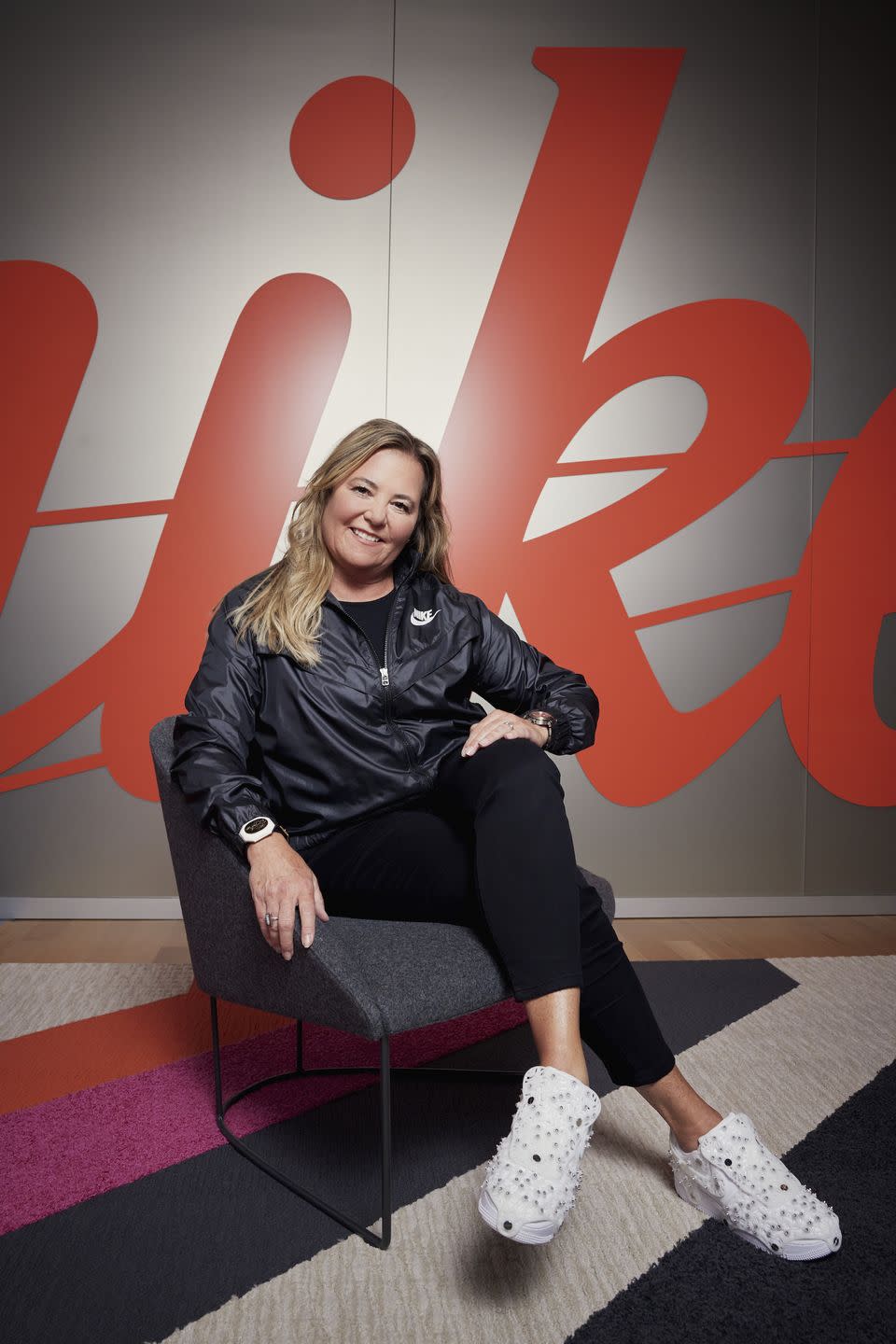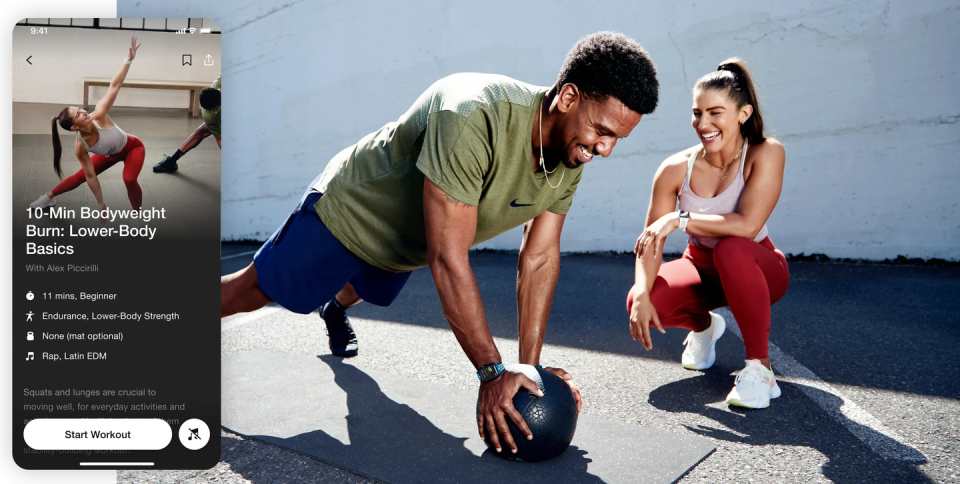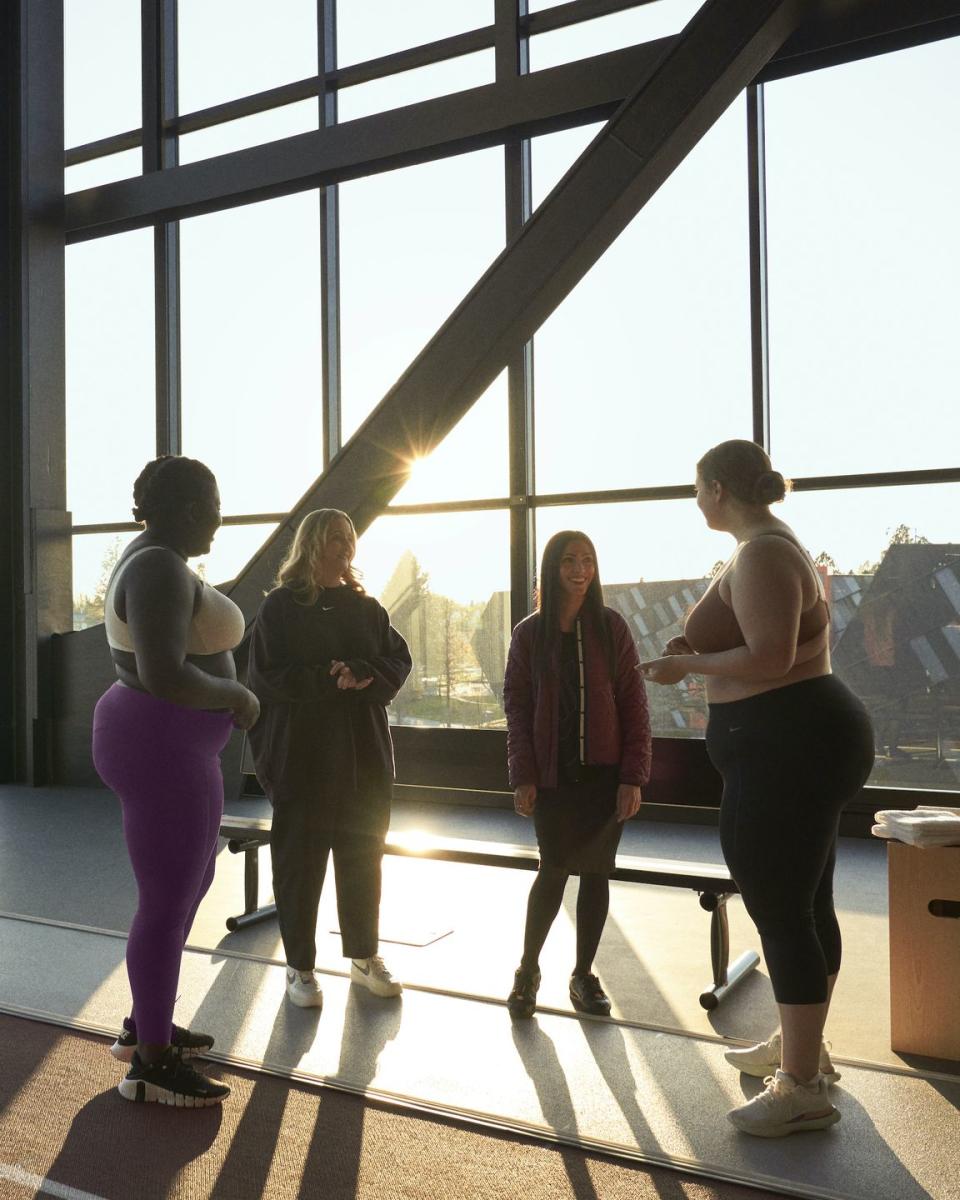Nike’s Heidi O’Neill On The Power Of Comebacks And The Evolution Of Sport

To say that sport is in Heidi O’Neill’s DNA is like saying world champion sprinter Dina Asher-Smith is a pretty good runner. As President of Consumer and Marketplace for Nike, Heidi first got the taste of sport while stringing tennis rackets in the back of her parents’ sports shop, aged eight, in Charlevoix, Michigan. ‘My dad loved sport so much,’ she recalls during our meeting at Nike London’s HQ. One snowy day her father saw a business opportunity to introduce the town’s 3,000 residents to Nordic skiing and roped her into cross-country skiing her way to school. ‘All of a sudden I ran into the local media,’ she laughs. ‘My dad wanted them to catch me skiing on camera. Sport was just the fabric of our family. Like Nike, my parents were storytellers; they believed in the power of sport, community, coaching and training.’
If you haven’t come across Heidi’s name before, here’s a quick breakdown: the University of Colorado Boulder graduate began her career at the global advertising agency Foote, Cone & Belding in the Nineties before taking the helm as director of marketing at Levi Strauss & Co. Since joining Nike in 1998 she’s gone from steering the global women’s division and co-founding the Nike School Innovation Fund to overseeing the company’s stores, e-commerce and apps globally. In 2017 she became a Spotify board member, and last year featured on Fortune’s Most Powerful Women list alongside the likes of Facebook’s Sheryl Sandberg.
It'd be fair to say that few brands boast such a strong identity and prominence in popular culture as Nike. There was Michael Jordan’s now history-defining Air Jordan series in 1985. Rachel Green (Jennifer Aniston) wearing a pair of boxfresh Air Max 96 trainers in Friends’ Thanksgiving episode, ‘The One with the Football.’ The ground-breaking (and controversial) 2018 Nike campaign featuring athlete and political activist Colin Kaepernick after he took the knee during the national anthem in protest of police brutality toward Black Americans. Personally, I’ll never forget the image of US footballer Brandi Chastain tearing off her T-shirt to reveal her black Nike sports bra following her game-winning penalty-kick goal in the 1999 World Cup final. As a child, it was the first time I’d witnessed the spirit of women’s liberation in a male-dominated sport long defined by patriarchal ideals of how female athletes should look and behave.

As for Heidi, her ‘Nike moment’ was more personal. Prior to joining the company, she was based in San Francisco and working for a brand undergoing an identity crisis. ‘We had to figure out who the brand was, what they stood for, and what they believed in,’ she recalls of the stressful time. Struggling to know how best to help the business grow, one night she did what anyone with a love of lycra does and took herself off to the gym to focus. After her workout, she stood in the women’ changing room, took off her sports bra – Nike, of course - and stared at it. ‘Printed inside a message read: ‘Engineered to the exact specifications of championship athletes.’ I thought to myself: Not only does Nike know who they are and what they stand for, but they’re so brave that they're going to stamp that promise on their product and commit to it. It was such a moment for me.’
That’s the thing about Nike. The reason for its success doesn’t lie just in its high-performance fabrics, fashion-forward designs or even its celebrity endorsements. Rather, it’s the sense of community and confidence you get from being associated with a brand that believes in and caters for your ability. In an industry regularly smeared for being elitist and judgmental, Nike has the unique talent of unifying its customers, regardless of whether you’re a beginner runner using the Nike Run Club App, or a Nike-sponsored Olympic heptathlete with an MBE. ‘If you have a body, you're an athlete,’ says Heidi, matter-of-factly. Explaining Nike’s unparalleled success as the world's largest women's athletic brands in the world, she continues: ‘It starts with our promise of bringing inspiration and innovation to every athlete in the world. We’re not here to sell another shoe for a marathon or a tank top, but to be your coach, personal trainer, personal shopper, squad and more.’
Ever since the business, formerly known as Blue Ribbon, launched its first shoe line in 1972, Nike has been at the forefront of innovation, functionality, and fashion. In the last 10 years it’s become the first sportswear brand to manufacture a performance hijab. It's designed a collection of maternity sports clothing to suit all stages of pregnancy and post-birth. It’s helped record-breaking runner Eliud Kipchoge run the first ever sub two-hour marathon in Nike Air Zoom Alphafly NEXT% trainers. It’s seamlessly crossed the boundary into high-fashion too, making its debut at the Met Gala in 2018 when tennis champion Serena Williams accessorised her yellow Atelier Versace dress with a pair of neon yellow Off-White x Nike Air Force 1 Low Volts. (Days after I speak to Heidi, the company announced its long-rumoured collaboration with the French fashion house Jacquemus).
But for a brand that prides itself on identity and self-expression, it finds itself now in an era where those principals are under threat. At least, for women. In 2018 Bernard Giudicelli, president of the French Tennis Federation, criticised Williams for wearing a black catsuit during the 2018 French Open. And last year, the Norwegian women's beach handball team were fined for eschewing the sport's bikini bottoms in the European Beach Handball Championships, while the German women's gymnastics team caused controversy by wearing ankle-length unitards (instead of the bikini-cut leotards) during qualifiers for the Olympics to make a stand against sexualisation in sport.
Heidi tells me that self-expression is imperative both for athletes and the future of their industry. ‘Sport and culture become an incredible palette if you think about self-expression,’ she insists. ‘The needs of an athlete are the North Star that carries us to self-expression… the best example of this is what we’re doing with the Jordan in taking its on-court dominance in basketball culture into streetwear. The opportunities to expand into self-expression are endless.’

The same can be said for the way the company is prioritising the importance of wellness both for customers (think of its running app, training clubs and playlists) as it does for its employees. Last year, the company broke new ground by offering workers a week off to decompress and focus on their mental health in the wake of the Coronavirus pandemic – a move O’Neill describes as a ‘big step’ for a global company. ‘We did it Nike style, which is about playing boldly, not knowing if it’d work or whether we’d do it again,’ she says. But, in true Nike form, it paid off. ‘I’m so proud to announce we're going to do it again this year. From the week of August 15 Nike will essentially “go dark”*.’
As for how Nike is changing sport and business’ male-dominated history, O’Neill says the work begins ‘at home’ with the company introducing more voices at the table. ‘Two years ago we didn’t have a female leader of a Geography - Nike has four: North America (NA), Europe, Middle East and Africa (EMEA), Greater China, and Asia Pacific and Latin America (APLA). Now three of the four Geographies have women running the business.’ While she credits male allies in helping women rise up the ranks in Nike, it’s women who have been a shining beacon for their contemporaries. If anyone knows the importance of this, it’s Heidi.
Heidi joined Nike soon after the birth of her second child. Desperate to get home to nurse her youngest son before bed, she says she’d often find herself creeping down the back stairs of the office to avoid her colleagues seeing her leaving on time. ‘I was running a big team and, as you know, we’re a pretty competitive company – we work hard and long. I didn't want to let people down,’ she admits. It wasn’t long before she grew tired of hiding her efforts to find a work/life balance and she soon became intent on showing her team that you don’t need to neglect family time to be good at your job. ‘I still laugh at what I did next because I don't think people saw the drama in it, but at 6pm I began walking down the hallway in the office and would tell people that I was leaving,’ she adds, imitating enthusiastically waving ‘good-bye’ to her colleagues. ‘It was important for my co-workers to see that,’ she adds. ‘One of the taglines that’s stuck with me from Nike’s recent Tiger Woods advert is: “What are you willing to do?” Women at Nike have been willing to do a lot in order to pave the way for others.’

This month, Nike celebrates its 50th anniversary and focussing on looking to the past and future for inspiration in order to bring sport to a new generation of athletes. In addition to designing the England football team’s national team kit, it’s promised to reset its women’s apparel sizing model to expand plus size designs across its portfolio by 2023, and to plough more investment into women’s sport. ‘If we invest in women in sport, it makes sport better and more inclusive,’ says Heidi.

Unsurprisingly, technology will also play a vital role in Nike’s future. Earlier this year the company opened its Serena Williams Building at Nike World HQ in Beaverton, Oregon where the company’s Consumer Creation teams now have access to 200,000 square feet of lab space to test new ideas and presentations. It also released a collection of customisable non-fungible token (NFT) trainers - dubbed Nike Cryptokicks - with the digital fashion brand RTFKT Studios. (A pair sold for over $130,000 in April).
‘Technology is a tool, but I see it as unlocking a vision that’s timeless,’ notes Heidi. ‘I'm proud of how Nike has incorporated digital and technology into what we do, but we haven't lost our way. We haven’t said that we’re a technology company – we’re a sport and fitness company serving athletes. I don't think you'll see us get lost in the metaverse - no pun intended – rather us playing out our core beliefs, innovating and taking risks. We want to keep our founders’ mindset to keep playing boldly and take the precious playbook we've had in the past, but ensure we continuing to reinvent it.’
RTFKT, together with Nike CryptoKicks, introduce the future of Sneakers, powered by Skin Vial tech
Welcome to 2052 : 🌐👟🧪 pic.twitter.com/7449L79Bf4— RTFKT (@RTFKT) April 22, 2022
As our time together draws to a close, I can’t help but ask Heidi what the company’s ever mysterious tagline ‘Just Do It’ means to her. She pauses. ‘It’s this idea of there always being a next chapter,’ she explains. ‘I told you about my family and their store when I was growing up and while it might sound perfect, we had some hard times. We ended up losing the store and went bankrupt. What I learned during that time is that the comeback after a setback takes a lot of courage. In my career, there have been comebacks. As a woman, there have been comebacks. But it’s our courage to have a comeback that’s truly amazing. That feels like my “just do it”.’
* The full week of August 15-19 will be paid time off for all corporate employees across Nike globally. Nike’s stores and distribution centres will remain open, with store athlete (retail) and distribution centre employees receiving a week’s worth of floating well-being days.
You Might Also Like

 Yahoo Finance
Yahoo Finance 